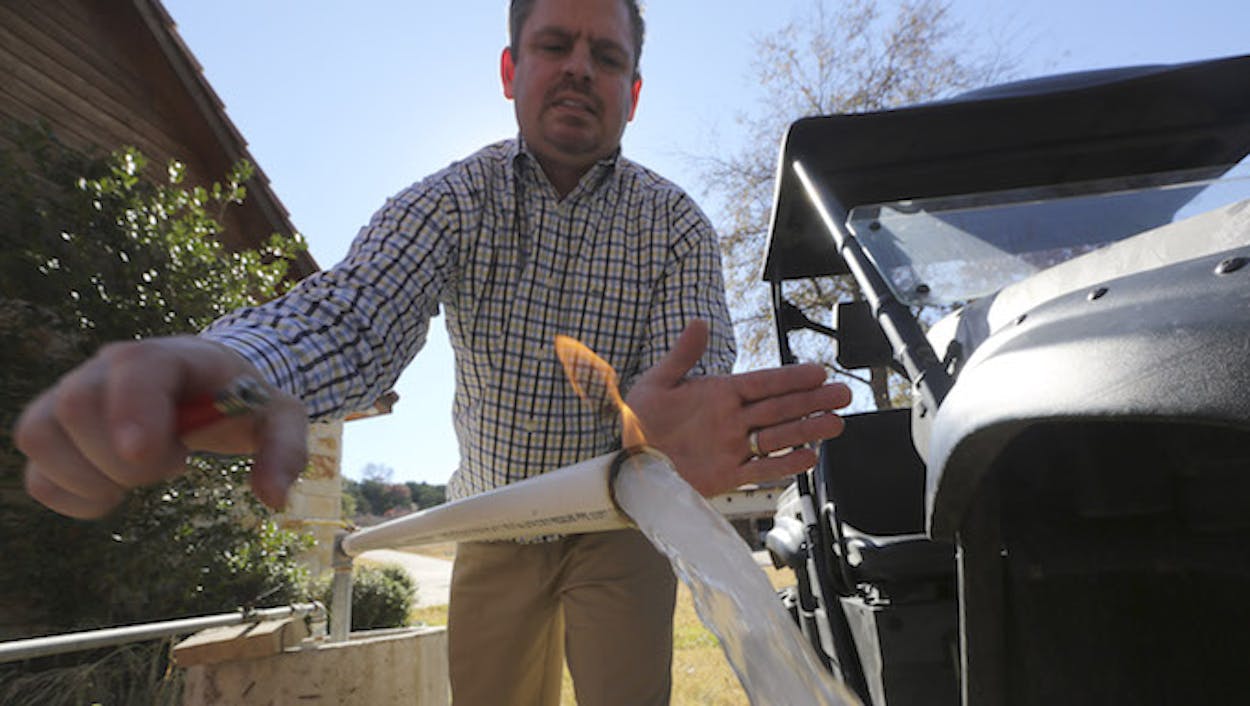Steve Lipsky says that when he holds a lighter at the end of his well spigot, his water sets on fire.
It didn’t always used to do that, of course. In 2009 Range Resources—an energy company—started fracking a half a mile from Lipsky’s Parker County home, and shortly thereafter, the two-hundred-foot deep water well that Lipsky and his wife used on their property started experiencing problems. According to a lawsuit:
A few months after moving into their new home, the Lipskys experienced mechanical problems with their well. They contacted a well-servicing company, which identified the problem as “gas locking,” a condition typically associated with an excess of natural gas in the ground water. A submersible pump’s ability to transport water from a well can be affected when too much gas is in the water.
Concerned about the gas in their well water, the Lipskys contacted local health officials who referred them to Alisa Rich, an environmental consultant with Wolf Eagle Environmental. After tests, Rich confirmed the presence of methane and other gases in the well. About this time, Lipsky made a video of himself lighting gas escaping from a garden hose attached to his well. To produce this effect, Lipsky connected the hose to a vent on his water well. He shared his video with the Environmental Protection Agency (EPA) and the media, which reported on the flammable nature of Lipsky’s water well. He also complained about the gas in his well to the Texas Railroad Commission. Lipsky’s own investigation led him to believe that Range, the oil and gas operator closest to his property, had some responsibility for contaminating his ground water.
The lawsuit that comes from isn’t one filed by Lipsky against Range Resources though. It’s from a lawsuit filed by Range, against Lipsky, who the company contends is defaming its character. And now the Texas Supreme Court has ruled that the lawsuit against Lipsky can proceed.
There are a number of issues at hand here, chief among them: if a company with $1.1 billion in liquidity can sue a guy for defamation, it’s going to be very difficult—or, at the very least, expensive—for that person to defend himself against those charges.
Lawsuits like that are often referred to as “SLAPP” lawsuits—“strategic lawsuits against public participation.” Simply being involved in the case is often punishment enough for the defendant. Range is suing Lipsky for $3 million. In similar cases in other states, Range has used lawsuits to encourage settlements that included conditions such as never speaking about the situation again for the rest of their lives, a stipulation that extended to the seven- and ten-year-old children living in the house.
It’s unclear what sort of settlement Lipsky might be offered, but with the lawsuit proceeding, the risk of losing at trial, and owing the company $3 million—or even the expense of defending against that suit—means that it wouldn’t be a surprise if he takes whatever he’s offered.
The other significant issue here, of course, is whether Range’s case has merit. Texas has an “anti-SLAPP” law that’s described as one of the strongest in the nation, but the Texas Supreme Court held that it didn’t apply here. According to the Dallas Observer, “Justice John P. Devine wrote that ‘homeowner Steve Lipsky has portrayed Range as incompetent, even reckless, as a gas producer, thereby injuring the company’s reputation.’”
At question is the video Lipsky made of himself setting the water coming out of his well on fire. The suit contends that the video is “misleading,” and different parties feel differently about that. The Environmental Protection Agency maintained until 2010 that the methane in the water that allows Lipsky to set it on fire is the result of Range’s wells, while the Texas Railroad Commission disputed that finding. (The EPA eventually withdrew that conclusion, and a 2013 Associated Press report offers a suggestion as to why they did so.)* Range maintains that Lipsky created the video with the intent of harming their business, by filming something that doesn’t accurately depict the conditions of his well.
Judge Devine’s opinion suggests that the fact that the video might have an impact on Range’s reputation is enough to allow the lawsuit to proceed, even if the company hasn’t yet proven that Lipsky’s video has actually had that effect. The judge’s opinion explains that the circumstantial evidence—that “accusations that Range’s fracking operations contaminated the aquifer” could “adversely affect the perception of Range’s fitness and abilities as a natural gas producer”—is sufficient to get past the anti-SLAPP law, because circumstantial evidence might allow the company to win its case, depending on the circumstances, thus it’s “nonsensical” to hold the company to a higher standard here.
What that means as a precedent beyond the case between Range and Lipsky is unclear, but it doesn’t look great for those who want a strong anti-SLAPP law in Texas.
(AP Photo/LM Otero, file)
*Correction: The headline and first sentence of this post have been changed to reflect that there is dispute over whether Lipsky can actually light his tap water on fire. An earlier version of this post wrote that “The Environmental Protection Agency maintains that the methane in the water was the result of Range’s wells.” The EPA withdrew that conclusion in 2010. We regret the error, and we have also uploaded a letter from Range to us that includes additional information.








